现在完成时_被动语态
英语现在完成时的被动语态

学习好资料欢迎下载英语(十八)Book2 Unit 3 语法现在完成时的被动语态构成:have/has been done 第三人称单数用has,第三人称复数以及其余人称用have。
否定式是在have/has 后加not,也可缩写成haven’t/hasn’t;构成疑问句时,附加问句借助于have/has。
特殊疑问句式:疑问词+have/has+主语+been+及物动词的过去分词。
1.表示发生在过去的动作对现在产生的影响或结果,这个动作是被动的。
This novel has been translated into several languages.2.还可以表示在过去发生的,已知延续到现在的并可能持续延续下去的被动动作或状态。
常与for或since引导的时间状语连用,或用于“How long…?”句型中。
The machine has been used for 3 years.3.用在时间或条件状语从句中,表示将来某时已完成的动作,即用现在完成时态的被动语态代替将来完成时的被动语态。
You can go home as soon as your homework has been finished.4.注意1)现在完成时的被动语态的两个助动词:have/has和been 缺一不可。
2)注意与一般过去时被动语态的区别。
一般过去时的被动语态表示一个被动的动作发生在过去,其结果对现在没有影响;而现在完成时的被动语态的动作或状态尽管发生在过去,但侧重说明该动作或状态对想在造成的影响或结果。
The machine has been repaired.(说明动作发生在过去,对现在有影响,“修好了”) The machine was repaired yesterday.(只说明动作发生在昨天)3)不可与确定的表过去或将来的时间状语连用(如yesterday,three days ago,in 1970,in 2050等),但可与不确定的时间状语连用(如already,yet,just,often,recently,in the past few years等)They have been punished recently.4)有些动词像finish,buy,start,begin,return,join,marry,open,die等,表示的动作很短暂,我们称之为短暂性动词或非延续性动词。
现在完成时被动语态
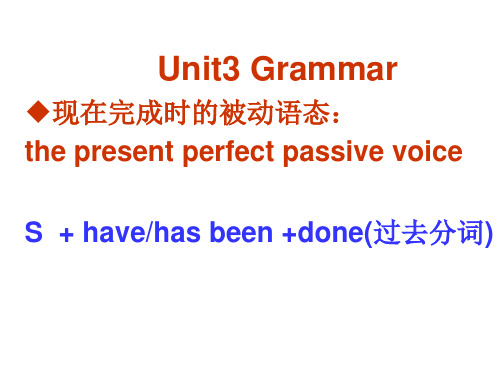
ever(曾经) Have you ever been to Beijing ? never(从不) I have never seen him .
since(自从…以来) I’ve worked in the school since 1999.
for(长达) He’s lived in Shenzhen for 6 years.
1、当你搬到一个新地方的时候可能会遇到困难。(arise) Difficulty may arise when you move to a new place. 2、他编造了一个故事来证明他是对的。(make up, prove) He made up a story to prove that he was right. 3、毕竟他已经不是个小孩,所以他应该为他所做的事情 负责任的。(after all) After all, he is not a child any more, so he should be responsible for what he does. 4、就我个人而言,没有他的帮助,我不可能成功。 (personally)
•Making up sentences using present perfect passive voice: machine
replace
computer
1The machine has been replaced by the computer
new bridge, build ,
in our city
Change the sentences into the present perfect passive voice把下面句子改成现在完成时的被动 语态。
1 We have received many letters since last week.
现在完成时的被动语态

现在完成时的被动语态现在完成时的被动语态是英语中的一种时态形式,用于表示动作的完成及其结果对主语的影响或对主语的经验、感受等的影响。
在句子中,被动语态的结构是“have/has been + 过去分词”。
被动语态表示的是动作的承受者或影响者,而不是动作的执行者。
下面将详细介绍现在完成时的被动语态的用法和构成。
一、肯定句的构成现在完成时的被动语态的肯定句结构为“have/has been + 过去分词”。
例如:- The book has been read by many people.- 这本书已经被很多人阅读。
在以上例子中,“The book”是被动句的主语,“has been read”是现在完成时的被动语态,“by many people”表示动作的执行者。
二、否定句的构成现在完成时的被动语态的否定句结构为“have/has not been + 过去分词”。
例如:- The letter has not been written yet.- 这封信还没有被写。
在以上例子中,“The letter”是被动句的主语,“hasnot been written”是现在完成时的被动语态。
三、疑问句的构成现在完成时的被动语态的疑问句结构为“Have/Has + 主语 + been + 过去分词+?”。
例如:- Has the work been completed?- 工作已经完成了吗?在以上例子中,“the work”是被动句的主语,“Has been completed”是现在完成时的被动语态。
四、现在完成时被动语态的用法1. 表示动作的完成及其结果对主语的影响:例如:- The house has been built for three months.- 这座房子已经建造了三个月。
在以上例子中,“house”是被动句的主语,“has been built”是现在完成时的被动语态。
这句话强调的是房子已经建造完成,并且对主语产生了一定的影响。
现在完成时被动语态的例句
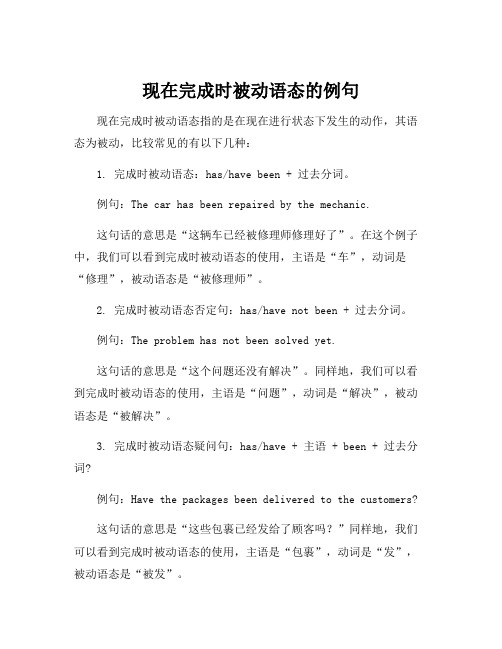
现在完成时被动语态的例句现在完成时被动语态指的是在现在进行状态下发生的动作,其语态为被动,比较常见的有以下几种:
1. 完成时被动语态:has/have been + 过去分词。
例句:The car has been repaired by the mechanic.
这句话的意思是“这辆车已经被修理师修理好了”。
在这个例子中,我们可以看到完成时被动语态的使用,主语是“车”,动词是“修理”,被动语态是“被修理师”。
2. 完成时被动语态否定句:has/have not been + 过去分词。
例句:The problem has not been solved yet.
这句话的意思是“这个问题还没有解决”。
同样地,我们可以看到完成时被动语态的使用,主语是“问题”,动词是“解决”,被动语态是“被解决”。
3. 完成时被动语态疑问句:has/have + 主语 + been + 过去分词?
例句:Have the packages been delivered to the customers?
这句话的意思是“这些包裹已经发给了顾客吗?”同样地,我们可以看到完成时被动语态的使用,主语是“包裹”,动词是“发”,被动语态是“被发”。
完成时被动语态可以帮助我们表达已经完成的动作,同时强调被
动语态,即强调动作的对象是被动的。
因此,在英语写作中,正确使
用完成时被动语态是非常重要的技巧,也会让你的文章更加生动有力。
现在完成时的被动语态

现在完成时的被动语态现在完成时被动语态是英语考试中的重要考点,需要注意以下几点:首先要掌握现在完成时被动语态的构成,即使用has/have been done。
当主语为单数时,使用has been done;当主语为复数时,使用have been done。
例如:This book has been XXX.(这本书已被翻译成许多语言。
)His bikes have been sold out.(他的自行车已售罄。
)其次,要理解现在完成时被动语态的概念。
它强调的是一个在过去发生的被动动作,有两个意思:一是动作已经完成,强调对现在的影响或结果;二是主语与谓语动词之间存在被动关系。
例如:Our classroom has been cleaned。
you needn't clean it now.(我们的教室已经被打扫过,你现在不需要再打扫了。
)These flowers have been watered。
you can go home.(这些花已经被浇水了,你可以回家了。
)最后,要掌握现在完成时被动语态的用法。
首先,它可以用于不知道动作执行者是谁的情况下。
例如:His XXX.(他的自行车被偷了。
)其次,它可以用于动作执行者是泛指或不言自明的情况下。
例如:Not a book in the library has been XXX.(图书馆里的书没有一本被拿走。
)第三,它可以用于可以说出动作执行者但动作承受者是谈话中心或特别需要强调的情况下。
例如:My watch has been repaired.(我的表已经修好了。
)第四,它可以用于出于委婉、礼貌而避免提及自己或对方的情况下。
例如:Enough has been said here on this n.(关于这个问题,这里已经谈得不少了。
)第五,它可以用于文章标题、广告、新闻等中,常用省略助动词be的被动语态。
例如:Road Blocked.(道路已被堵塞。
现在完成时被动

A. are not decided C. is not being decided
B. have not been decided D. has not been decided
3. That book _________into at least 20 D foreign languages. A. has said to be translated B. has been said to have translated C. is said that it had been translated D. is said to have been translated
这项计划已经由专家研究过三次了。
2. 说话时已经完成的动作或出现的结果。 如: The door has been locked. 门已经被锁上了。 (我或别人现在进不去) 3. 动作或状态始于过去, 持续到现在, 并可 能持续下去。如: He has been told about it for many times.
7. Have you ever___ to the exhibition
which ___for three weeks?
A. gone; has been shown
B. visited; shown
C. been; has been on show D. went; lasted
1. ---How long _____ at this job? B
--- Since 1990. A. were you employed B. have you been employed C. had you been employed D. will you be employed
现在完成时和被动语态

现在完成时1.概念:过去发生或已经完成的动作对现在造成的影响或结果,或从过去已经开始,持续到现在的动作或状态。
2.时间状语:recently, lately, since…for…,in the past few years, etc.3.基本结构:have/has + done4.否定形式:have/has + not +done.5.一般疑问句:have或has提前对于初接触现在完成时的人来说,往往会产生一种茫然,因为它似乎与一般过去时相似。
那就是,这两种时态描述的动作都始于过去。
其实不然,现在完成时主要表示,发生在过去的动作延续到现在刚刚完成、或许还要延续;侧重于这个动作对现在带来的结果、产生的影响、积累的总和等等。
而一般过去时则只不过是表示动作发生在过去的什么时候。
弄清了这一区别,就很容易理解现在完成时了。
它主要适用于下面的几种情况:1)表示截止现在业已完成的动作By now, I have collected all the data that I need .到现在为止,我已收集到了我所需的全部资料。
She has read 150 pages today .她今天已看了150页。
2)表示发生在过去而对现在产生影响、带来结果的动作Have you had your dinner? 你吃晚饭了吗?3)表示过去发生的动作持续到现在,并可能还要延续It has been five years since he joined the army .他参军五年了。
1)一个句子应该用什么时态只能取决于它需要表达的意思,以及它所处的语言环境。
例如:He speaks English .(一般现在时,说明动作发生的经常性。
)He spoke English when he was in New Zealand .(一般过去时,说明动作发生的时间。
)He is speaking English.(现在进行时,说明动作正在进行。
【语法】现在完成时被动语态
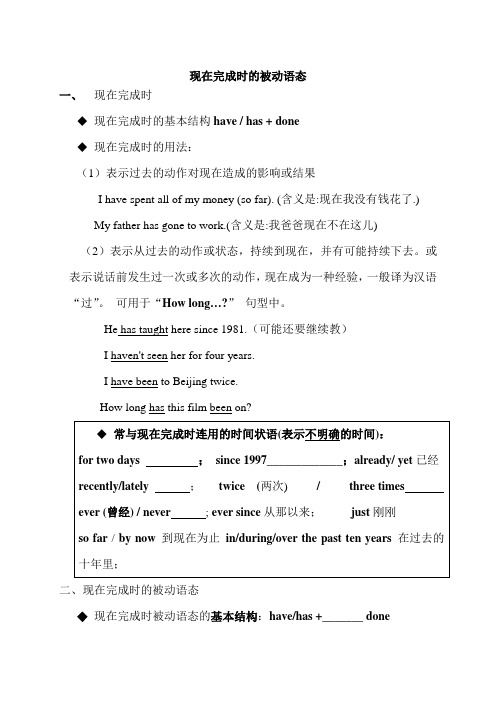
现在完成时的被动语态一、现在完成时◆现在完成时的基本结构have / has + done◆现在完成时的用法:(1)表示过去的动作对现在造成的影响或结果I have spent all of my money (so far).(含义是:现在我没有钱花了.)My father has gone to work.(含义是:我爸爸现在不在这儿) (2)表示从过去的动作或状态,持续到现在,并有可能持续下去。
或表示说话前发生过一次或多次的动作,现在成为一种经验,一般译为汉语“过”。
可用于“How long…?”句型中。
He has taught here since 1981.(可能还要继续教)I haven't seen her for four years.I have been to Beijing twice.How long has this film been on?二、现在完成时的被动语态◆现在完成时被动语态的基本结构:have/has +_______ done现在完成时被动语态的否定结构:complete______________ admit_______________ raise______________ replace______________ advertise_____________ solve_____________1. She has cleaned the windows.(改成被动语态)主语谓语宾语The windows (by her).主语谓语2. He hasn’t washed the dirty clothes. (改成被动语态)____________________________________________将下列句子改成被动语态。
1. Mary has locked the door.2. I have finished my homework.3. I have read this book many times.4. Tom has not repaired the computer.5. Jane has referred to the book.6. We have put up a notice on the wall.三、注意事项:1.与一般过去时的被动语态的区别。
08.现在完成时的被动语态
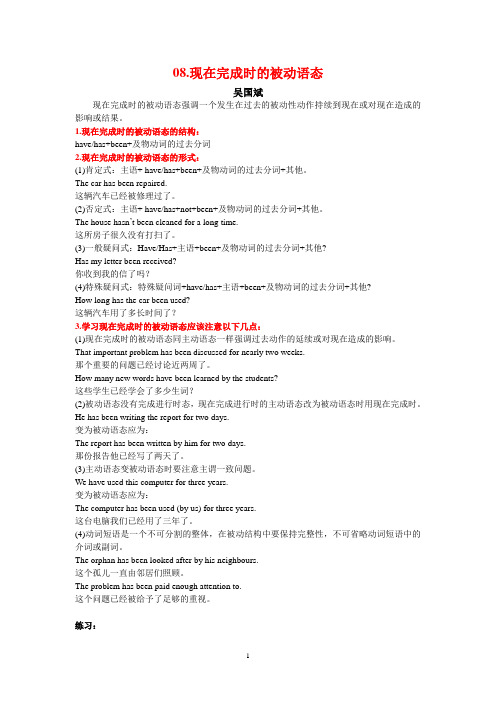
08.现在完成时的被动语态吴国斌现在完成时的被动语态强调一个发生在过去的被动性动作持续到现在或对现在造成的影响或结果。
1.现在完成时的被动语态的结构:have/has+been+及物动词的过去分词2.现在完成时的被动语态的形式:(1)肯定式:主语+ have/has+been+及物动词的过去分词+其他。
The car has been repaired.这辆汽车已经被修理过了。
(2)否定式:主语+ have/has+not+been+及物动词的过去分词+其他。
The house hasn’t been cleaned for a long time.这所房子很久没有打扫了。
(3)一般疑问式:Have/Has+主语+been+及物动词的过去分词+其他?Has my letter been received?你收到我的信了吗?(4)特殊疑问式:特殊疑问词+have/has+主语+been+及物动词的过去分词+其他?How long has the car been used?这辆汽车用了多长时间了?3.学习现在完成时的被动语态应该注意以下几点:(1)现在完成时的被动语态同主动语态一样强调过去动作的延续或对现在造成的影响。
That important problem has been discussed for nearly two weeks.那个重要的问题已经讨论近两周了。
How many new words have been learned by the students?这些学生已经学会了多少生词?(2)被动语态没有完成进行时态,现在完成进行时的主动语态改为被动语态时用现在完成时。
He has been writing the report for two days.变为被动语态应为:The report has been written by him for two days.那份报告他已经写了两天了。
现在完成时的被动语态

现在完成时的被动语态的注意事项
及物动词才能用被动语 态
例如:The book has been read. (正确) vs The book has been sleep. (错误)
过去分词要正确使用
例如:The letter has been write. (错误) vs The letter has been written. (正确)
Affirmative
主语 + have/has + been + 过去分词
Negative
主语 + have/has + not + been + 过去分词
Interrogative
Have/Has + 主语 + been + 过去分词?
现在完成时的被动语态的用法和意义
1 表示经验和经历
2 强调结果
现在完成时的被动语态
现在完成时的被动语态是英语中一种重要的时态形式。它可以用来描述在过 去一段时间内发生过的被动动作或状态对现在的影响。
现在完成时的定义和结构
现在完成时是由"have/has + been + 过去分词"构成的。它表示动作在过去某 个时间点开始发生,并一直延续到现在。
现在完成时的被动语态形式
现在完成时的被动语态的非延 续性动词
有些动词不常与延续性动作连用,而更适合与非延续性动作连用,例如: arrive, come, die, fall, happen, leave, meet, occur, etc.
现在完成时的被动语态的延续 性动词
有些动词常与延续性动作连用,例如:live, work, study, teach, learn, write, etc.
现在完成时的被动语态
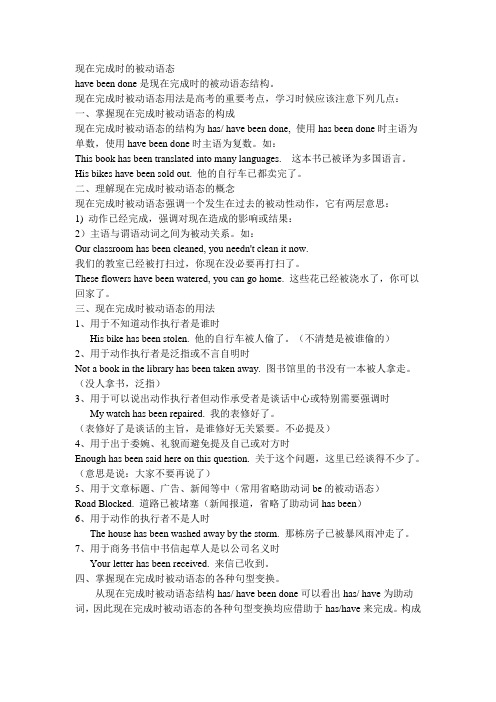
现在完成时的被动语态have been done是现在完成时的被动语态结构。
现在完成时被动语态用法是高考的重要考点,学习时候应该注意下列几点:一、掌握现在完成时被动语态的构成现在完成时被动语态的结构为has/ have been done, 使用has been done时主语为单数,使用have been done时主语为复数。
如:This book has been translated into many languages.这本书已被译为多国语言。
His bikes have been sold out. 他的自行车已都卖完了。
二、理解现在完成时被动语态的概念现在完成时被动语态强调一个发生在过去的被动性动作,它有两层意思:1) 动作已经完成,强调对现在造成的影响或结果:2)主语与谓语动词之间为被动关系。
如:Our classroom has been cleaned, you needn't clean it now.我们的教室已经被打扫过,你现在没必要再打扫了。
These flowers have been watered, you can go home. 这些花已经被浇水了,你可以回家了。
三、现在完成时被动语态的用法1、用于不知道动作执行者是谁时His bike has been stolen. 他的自行车被人偷了。
(不清楚是被谁偷的)2、用于动作执行者是泛指或不言自明时Not a book in the library has been taken away. 图书馆里的书没有一本被人拿走。
(没人拿书,泛指)3、用于可以说出动作执行者但动作承受者是谈话中心或特别需要强调时My watch has been repaired. 我的表修好了。
(表修好了是谈话的主旨,是谁修好无关紧要。
不必提及)4、用于出于委婉、礼貌而避免提及自己或对方时Enough has been said here on this question. 关于这个问题,这里已经谈得不少了。
现在完成时的被动语态

现在完成时的被动语态的主要用法
1.表示过去发生的动作对现在造成的影响或结果 Eg.I’m sorry,the letters haven’t been typed yet.很抱
歉,这些信件还没有被打印出来。(结果是现在还拿不到 这些信件) 2.表示一个被动的动作或状态开始于过去,持续到现在, 并有可能持续下去,常与for 或since 引导的时间状语连 用或用于How long …?的句型中 Eg.The plan has been discussed for nearly two hours. 这项计划句:Have/Has +主语+been done +其他
Eg.Has his new novel been translated into English ? 他的新小说被译成英语了吗?
4.特殊疑问句:特殊疑问词+have /has +been done +其他
Eg.How long has the car been used ?这辆车用了多 久了?
现在完成时的被动语态
含义与基本构成
现在完成时的被动语态强调一个发生在过去的被动 性动作持续到现在或对现在造成的影响或结果。
基本构成:have/has +been +及物动词的过去分词
现在完成时的被动语态的形式
1.肯定句中:主语+have/has +been +及物动词过去 分词(done)+其他
3.用在时间或条件状语从句中表示将来某时已完成 的动作,即用现在完成时的被动语态代替将来完成 时的被动语态
Eg.You can go home as soon as your task has been finished.你的任务一完成就可以回家。
现在完成时与被动语态

1.现在完成式的概念:现在完成时表示动作发生在过去,其结果对现在有影响。
例如:tom has gone out(go的动作发生在过去,对现在有影响。
)2.延续性动词可以和表示一段时间的时间状语连用;非延续性动词动词则不可以。
正确说法:the traIn has been In the statIon for tWo hours。
错误说法:the traIn has stopped In the statIon for tWo hours。
延续性动词定义:动作有持续性,可以持续一段时间。
例如lIve(居住)就可以lIve一年两年例词:lIsten,plaY,raIn,Work非延续性动词动作在短时间内结束,不能延续。
例如marrY(结婚)就不能marrY一年两年。
arrIve,begIn,borroW,fInsIh3.现在完成时的构成:(1)have(has)+过去分词:tom has gone out(2)现在完成时的否定和疑问形式:否定形式在has,have后加not;疑问形式将has和have 提前:has tom gone out(3)过去分词的概念及其变化形式:概念:它和现在形式时中的“动词的Ing形式”一样,只是英语中表达时态的一种固定形式。
变化形式:大多数动词的过去分词的外形和动词的过去式是完全一样的。
只有那些不规则变化的动词,它们的过去分词和过去式才会不一样。
现在完成时讲解1 构成方式构成:主语(第一、二人称单复数)+have主语(第三人称复数)+have主语(第三人称单数)+has +过去分词2 基本用法1) 表示过去发生或已完成的某个动作对现在产生的影响或结果,强调的是这个影响或结果,常同already, just, yet等状语连用例:I have just turned off the light. 我刚刚把灯关上。
(结果是灯已经关上了)She has lost her bike. 她把自行车丢了。
现在完成时被动语态
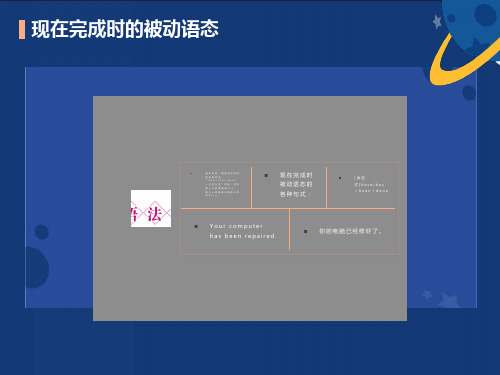
01
The plan has been discussed for nearly 2 hours.
02
这项计划已被讨论了近两个小时了。
03
用在时间或条件状语从句中,表示将来某时已完成的动作,即用现在完成时的被动语态代替将来完成时的被动语态。
________the program________ ________(develop) yet?If not,you’d better get it ready as soon as possible. 答案: Has;been developed —Are you going to the party? —No,I________ ________ ________(not invite) yet. 答案: haven’t been invited
01
答案: has been hit
02
.单项填空 —Is the meeting held in Room 302 or 303? —It should be 302.But I hear that it________till tomorrow. A.was put off B.will put off C.has been put off D.is put off
解析: 考查时态和语态。job与promise之间为被动关系,故应考虑被动语态形式,再考虑到“before leaving their hometowns”,表示动作已经发生,故用完成时。所以现在完成时的被动式为正确形式。
答案: D
(2009·全国卷Ⅰ)His sister left home in 1998,and________since. had not been heard of has not been heard of had not heard of has not heard of
现在完成时被动语态
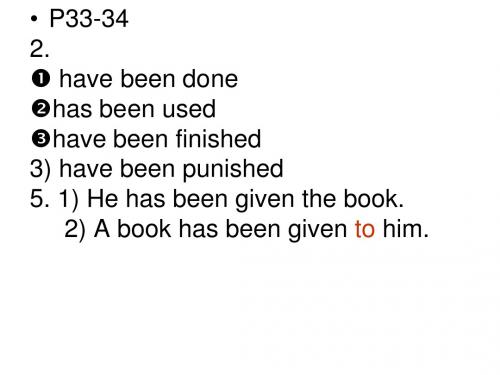
2.现在完成时被动语态否定句句型: 主语+ have/has +not+ been+过去分词
The task has not been finished yet. Many skilled workers have not been trained in the company.
6.1) He has been asked to help you. 2) He has been made to work hard. 7.1) The book has been referred to by him. 2) A way of ding it has been thought of . 8. 1)The American Civil War broke out in 1861. 2) The accident (which happened yesterday) surprised all of us .
什么情况下使用现在完成时?
Case 1: Something ought to have been done before now. The machine has been used for 3 years. 1. Over time I have been changed quite a lot . 2. First as a PC and then as a laptop I have been used in offices and homes since the 1970s. 3. … I never forget anything I have been told ! 4. Since the 1970s many new applications have been found for me.
现在完成时被动语态

精品课件
4. ---- How long ____ at this job? ---- Since 1990. A. were you employed B. have you been employed C. had you been employed D. will you be employed
This book was 精品课件 published in
(2) 强调动作的承受者, 而不强调动作的执行 者。
如: The window was broken by Mike.
窗户是迈克打破的。
This book was written by him.
这本书是他写的。
精品课件
Exercises
中。 如: (1) How long has the machine been used?
这机器使用有多久了? (2)He has been told about it for many times.
有人告诉他这事很多次了。 精品课件 (可能还会有人
1. 并不是所有动词都有被动语态
1) happen, take place, break out, belong to, take part in , cost, last等不及物动词或词组无被动语态。(字典里
精品课件
. 现在完成时的被动语态 一、概念 现在完成时的被动语态强调过去的 动作对现在造成的影响或结果,但 主语为动作的承受者,表示“…… 已经被……”。 如: (动作的承受者) The new school has been set up. 新学校已经建成了。
精品课件
二、形式
(1)肯定式为:have/ has +been +done。
现在完成时的被动语态
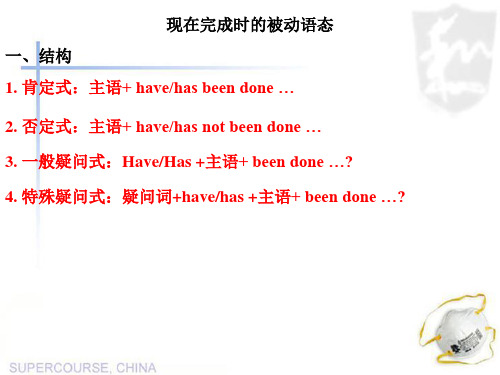
3. 在状语从句中,常与现在时态的完成时被动语态代替将来时的被 动语态。
I will go home when my homework has been finished. 当我已经完成家庭作业时我就回家。
三、注意事项 1. 现在完成时的被动语态中has/have been 不可漏掉。 The dirty clothes have been washed. 2. 现在完成时的被动语态强调过去发生的事与现在有联系;而一般
二、用法 1. 表示过去发生的动作对现在产生的影响和结果,且这个动作与句 子的主语有逻辑上的动宾关系。 I have been told the sports meet will be put off. 我已经被告知运动会将要被推迟。
2. 表示一个被动的动作或状态从过去开始,持续到现在,并且有可
能继续持续下去。常与for+时间段或since+时间点等时间状语连用, 此时,该被动语态的动词应使用延续性动词。 The machine has been repaired for two hours. 这台机器已经被修了两个小时了。
现在完成时的被动语态 一、结构 1. 肯定式:主语+ have/has been done …
2. 否定式:主语+ have/has not been done … 3. 一般疑问式:Have/Has +主语+ been done …?
4. 特殊疑问式:疑问词+have/has +主语+ been done …?
过去式的被动语态所表示的动作只与过去有联系,与现在没有关系。
The library has been built.
The library was built last year.
- 1、下载文档前请自行甄别文档内容的完整性,平台不提供额外的编辑、内容补充、找答案等附加服务。
- 2、"仅部分预览"的文档,不可在线预览部分如存在完整性等问题,可反馈申请退款(可完整预览的文档不适用该条件!)。
- 3、如文档侵犯您的权益,请联系客服反馈,我们会尽快为您处理(人工客服工作时间:9:00-18:30)。
现在完成时被动语态一、改成被动语态1. Workers have built the house since two years ago.2. We have received many letters since last week.3. My friend has bought a new personal computer.4. The shop has repaired my computer very quickly.二、连词成句1. The buildings, destroy, earthquake2. The machine,replace,the computer3. A new bridge, build, in our city4. Many trees, plant, along the road5. The problem, not, solve, we, yet三、适当形式填空1. How many workers _____________ (已派遣sent) to build the railway?2. — Why does Mary look so unhappy?— She _________________ (被嘲笑laugh at) by her classmates.3. It is said that the house __________________________ (闯进了break into) by two thieves.4. The two pens ________________________________ (未被拿走take away) by him.5. Where ______ the television _____________________ (已经修理了repair)?6. The price of a color TV set __________________________ (降价了bring down) again.7. What _____________________ (已被译成translate) into many foreign languages?四、正确时态填空1. The floor in our classroom_____________ (mop) every day2. Many accidents __________(cause) by careless driving.3. I ____________ (ask) to clean my room on Monday.4. We ___________(take)to that hospital by a taxi.5. A new coat __________(buy) for me by my mother last week.6. China's first television station _________(set up) by the workers in 19587. He ____________________(recognize) as soon as he arrives at this city8. All those old buildings _____________________(knock down )tomorrow.9. A new village for the athletes and all the stadiums ________________(to the east of London.10. Do you know the thief __________________ (catch) by the police?11. All the preparations for the project ________________(complete),And we’re ready to start.12. ---How many times_____________________ (you ,tell ) not to play with fire?-I’m sorry. I’ll never do that again.13. The homework __________________ (must , hand in ) tomorrow.14. The flowers____________________(should, water) once a week.五.单选1. Both my brother work at the power station that _____ in my hometown.A. has set upB. has been set upC. was set upD. is set up2. _____ the sports meet will be put off.A. I’ve been toldB. I’ve toldC. I’m tol dD. I told3. All the preparations for the task _____, and we’re ready to start.A. completedB. completeC. had been completedD. have been done4. --- How long _____ at this job? --- Since 1990.A. were you employedB. have you been employedC. had you been employedD. will you be employed5. When and where to go for the on-salary holiday _____ yet.A. are not decidedB. have not been decidedC. is not being decidedD. has not been decided6. Betty _____ injured since last Saturday.A. has beenB. wasC. isD. has7. That book _____ into at least 20 foreign languages.A. has said to be translatedB. has been said to have translatedC. is said that it had been translatedD. is said to have been translated8. --- Hi, Tom, you look tired. --- Of course. I _____ the living room all day.A. had paintedB. paintedC. have been paintedD. have been painting9. --- Did you move into the new house? --- No. The rooms ______ yet.A. were being paintedB. are paintingC. have not paintedD. have not been painted10. Great changes _____ in my hometown and a lot of factories _____.A. have been taken place; are being set upB. have taken place; have been set upC. are taken place; had been set upD. took place; will set up11. It’s sai d that this book _____ into Chinese.A. had translatedB. has translatedC. was translatedD. has been translated12. You can’t move in .The house _____.A. is paintingB. is being paintedC. has paintedD. has been painted13. Millions of pounds’ worth of damage _____ by a storm which swept across the north ofEngland last night.A. has been causedB. had been causedC. will be causedD. will have been cause14. Have you ever _____ to the exhibition which _____ for three weeks?A. gone; has been shownB. visited; shownC. been; has been on showD. went; lasted15. --- How long ago _____ these eggs _____? --- Perhaps 15 days.A. will; hatchB. did; hatchC. were; hatchedD. have; been hatched16. The construction of the two new railway lines _____ by now.A. has completedB. have completedC. have been completedD. has been completed17. I got caught in the rain and my suit _____.A. has ruinedB. had ruinedC. has been ruinedD. had been ruined18. — I have got a headache.— No wonder. You _____ in front of that computer too long.A. workB. are workingC. have been workingD. workedKEYS: 1 B 2A 3 D 4B 5D 6A 7D 8D 9D 10B 11C 12 B 13 A 14C 15C 16D 17C 18C。
